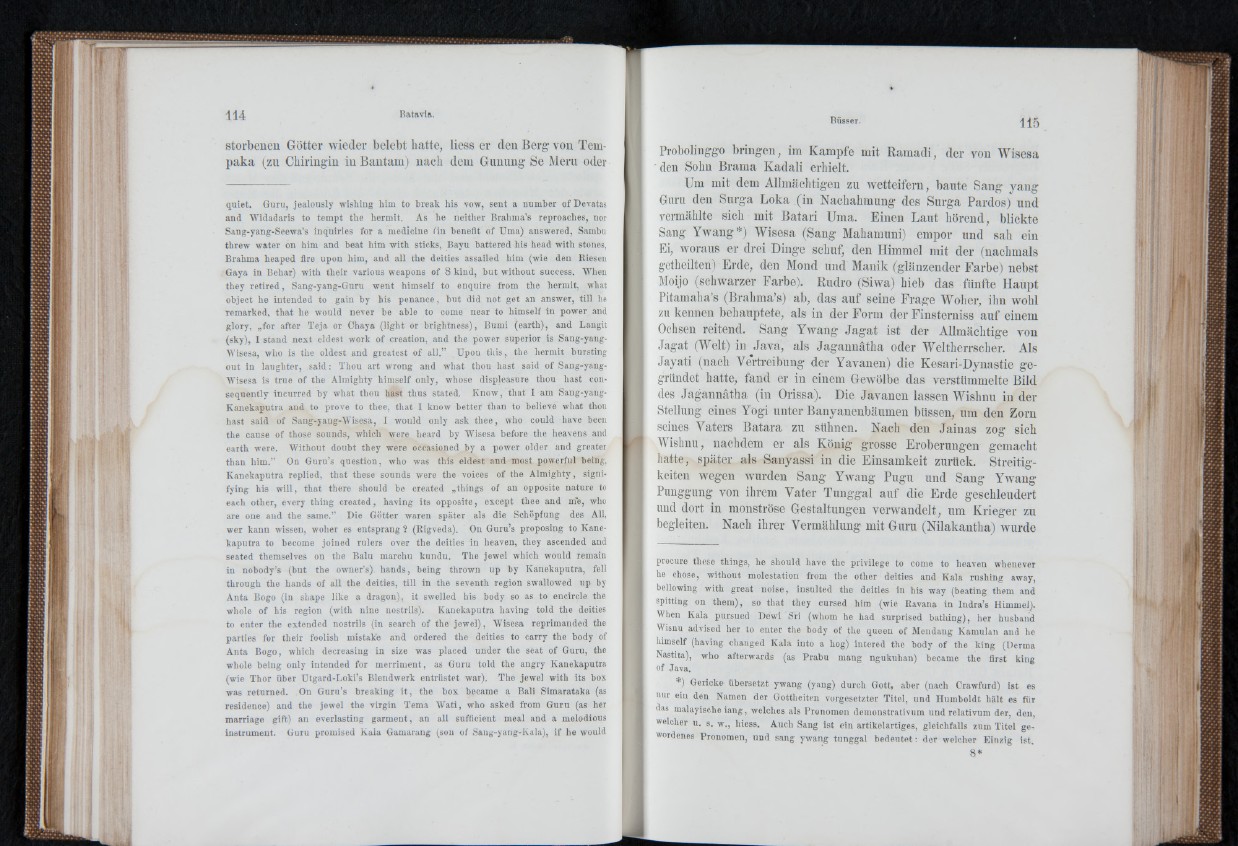
storbenen Götter wieder belebt hatte, liess er den Berg von Tem-
pak a (zu Chiringin in Bantam) nach dem Gunung Se Meru oder
quiet. Guru, jealously wishing Mm to break his vow, sent a number of Devatas
and Widadaris to tempt the hermit. As he neither Brahma’s reproaches, nor
Sang-yang-Seewa’s inquiries for a medicine fin benefit öf Uma) answered, Sambu
threw water on him and beat him with sticks, Bayu battered his head with stones,
Brahma heaped Are upon him, and all the deities assailed him (wie den Kiesen
Gaya in Behar) with their various weapons of 8 kind, but without success. When
they retired, Sang-yang-Guru went himself to enquire from the hermit, what
object he intended to gain by his penance, but did not get an answer, till he
remarked, that he would never be able to come near to himself in power and
glory, „for after Teja or Chaya (light or brightness), Bumi (earth), and Langit
(sky), I stand next eldest work of creation, and the power superior is Sang-yang-
Wisesa, who is the oldest and greatest of all.” Upon th is, the hermit bursting
out in laughter, .sa id : Thou art wrong and what thou hast said of Sang-yang-
Wisesa is true of the Almighty himself only, whose displeasure thou hast consequently
incurred by what thou hast thus stated. Know, that I am Sang-yang-
Kanekaputra and to prove to thee, that I know better than to believe what thou
hast said of Sang-yang-Wisesa, I would only ask the e , who could have been
the cause of those sounds, which were heard by Wisesa before the heavens and
earth were. Without doubt they were occasioned by a power older and greater
than him.” On Guru’s question, who was this eldest and most powerful being,
Kanekaputra replied, that these sounds were the voices of the Almighty, signifying
his w ill, that there should be created „things of an opposite nature to
each other, every thing created, having its opposite, except thee and mb, who
are one and the same.” Die Götter waren später als die Schöpfung des All,
wer kann wissen, woher es entsprang ? (Rigveda). On Guru’s proposing to Kanekaputra
to become joined rulers over the deities in heaven, they ascended and
seated themselves on the Balu marchu kundu. The jewel which would remain
in nobody’s (but the owner’s) hands, being thrown up by Kanekaputra, fell
through the hands of all the deities, till in the seventh region swallowed up by
Anta Bogo (in shape like a dragon), it swelled his body so as to encircle the
whole of his region (with nine nostrils). Kanekaputra having told the deities
to enter the extended nostrils (in search of the jew e l), Wisesa reprimanded the
parties for their foolish mistake and ordered the deities to carry the body of
Anta Bogo, which decreasing in size was placed under the seat of Guru, the
whole being only intended for merriment, as Guru told the angry Kanekaputra
(wie Thor über Utgard-Loki’s Blendwerk entrüstet war). The jewel with its box
was returned. On Guru’s breaking i t , the box became a Bali Simarataka (as
residence) and the jewel the virgin Tema Wati, who asked from Guru (as her
marriage gift) an everlasting garment, an all sufficient meal and a melodious
instrument. Guru promised Kala Gamarang (son of Saug-yaug-Kala), if he would
Probolinggo bringen, im Kampfe mit Ramadi, der von Wisesa
den Sobn Brama Kadali erhielt.
Um mit dem Allmächtigen zu wetteifern, baute Sang yang
Guru den Surga Loka (in Nachahmung des Surga Pardos) und
vermählte sich mit Batari Uma. Einen Laut hörend, blickte
Sang Ywang*) Wisesa (Sang Mahamuni) empor und sah ein
Ei, woraus er drei Dinge schuf, den Himmel mit der (nachmals
getheilten) Erde, den Mond und Manik (glänzender Farbe) nebst
Moijo (schwarzer Farbe). Rudro (Siwa) hieb das fünfte Haupt
Pitamaha’s (Brahma’s) ab, das auf seine Frage Woher, ihn wohl
zu kennen behauptete, als in der Form der Finsterniss au f einem
Ochsen reitend. Sang Ywang J a g a t ist der Allmächtige von
Jagat (Welt) in Java, als Jagannätha oder Weltherrscher. Als
Jayati (nach Vertreibung der Yavanen) die Kesari-Dynastie gegründet
hatte, fand er in einem Gewölbe das verstümmelte Bild
des Jagannätha (in Orissa). Die Javanen lassen Wishnu in der
(S te llu n g eines Yogi unter Banyanenbäumen büssen, um den Zorn
seines Vaters Batara zu sühnen. Nach den Jainas zog sich
Wishnu, nachdem er als König grosse Eroberungen gemacht
hatte, später als Sanyassi in die Einsamkeit zurück. Streitigkeiten
wegen wurden Sang Ywang Pugu und Sang Ywang
Punggung von ihrem Vater Tunggal au f die Erde geschleudert
und dort in monströse Gestaltungen verwandelt, um Krieger zu
begleiten. Nach ihrer Vermählung mit Guru (Nilakantha) wurde
procure these things, he should have the privilege to come to heaven whenever
he chose, without molestation from the other deities and Kala mshing away,
bellowing with great noise, insulted the deities in his way (beating them and
spitting on them), so that they cursed him (wie Ravana in Indra’s Himmel).
When Kala pursued Dewi Sri (whom he had surprised hathing), her husband
Wisnu advised her to enter the body of (he queen of Mendang Kamulan and he
himself (having changed Kala into a hog) intered the body of the king (Derma
Nastita), who afterwards (as Prabu mang ngukuhan) became the first king
of Java,
*) Gericke übersetzt ywang (yang) durch Gott, aber (nach Crawfurd) ist es
nur ein den Namen der Gottheiten Vorgesetzter Titel, und Humboldt hält es für
das malayische ian g , welches als Pronomen demonstrativum undrelativum der, den,
welcher u. s. w., hiess. Auch Sang ist ein artikelartiges, gleichfaBs zum Titel ge-;
wordenes Pronomen, und sang ywang tunggal bedeute t: der welcher Einzig ist.
8 *